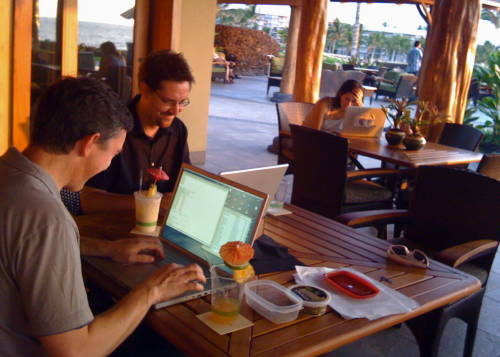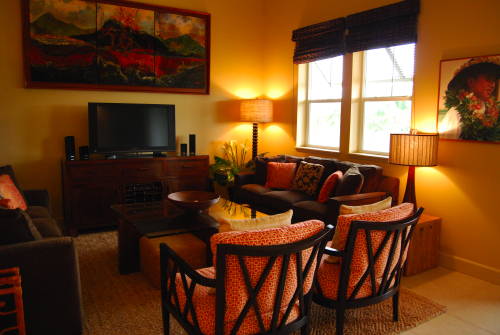 I recently spent four days on a writing retreat on the Big Island of Hawaii with three of my closest friends/collaborators. A writing retreat is basically where you abscond from your office to some resort-like place for a several days (or weeks) to concentrate on a specific task, ideally a paper. I think it’s particularly useful to retreat with collaborators who are usually not in the same place at the same time. You could call it a working holiday or a collaboration meeting (this one is best for the expense report), but since it’s publish or perish, I like the goal of writing front and center. Theorists have the Aspen Center for Physics, but the rest of us need to make it happen on our own.
I recently spent four days on a writing retreat on the Big Island of Hawaii with three of my closest friends/collaborators. A writing retreat is basically where you abscond from your office to some resort-like place for a several days (or weeks) to concentrate on a specific task, ideally a paper. I think it’s particularly useful to retreat with collaborators who are usually not in the same place at the same time. You could call it a working holiday or a collaboration meeting (this one is best for the expense report), but since it’s publish or perish, I like the goal of writing front and center. Theorists have the Aspen Center for Physics, but the rest of us need to make it happen on our own.
This was my fourth retreat and it was the best so far. In this post, I’ve compiled a list of what I think makes a successful writing retreat but everybody works differently so be sure to tweak these suggestions for your own group’s needs and preferences.
The Group
- People who have a desire and commitment to work. It’s going to be fun, but it’s not a vacation. As long as everybody is committed and adult, there will be no need for anybody to be in charge or babysit.
- Complimentary scientific expertise and experiences covering a range of pay grades. A mix of grad students, postdocs, and senior researchers works well. Ideally, coauthors on the publications being worked on.
- Plays well together. Since you’re going to be sharing a living space and cooking together, ideally, every participant should agree on the other members. Usually, I know of 1-2 people that I really want to retreat with and then I consult with them on the other invitees.
- I’ve had good experience with both small (4 ppl) and large (8 ppl) groups. Four is a good number. I think the main problem with larger groups is finding a big enough condo. I’ve considered spreading out into two nearby condos but I haven’t tried that out yet.
The Place
- A condo or house with a kitchen, ideally in a resort. Cooking meals is more time and cost efficient than dining out.
- Walking distance to pool/jogging path/beach/ski slope. Breaks are crucial for encouraging “ah-ha” moments, especially during times of intense focus. Individuals should be able to take breaks at their leisure and without requiring the consensus of the group.
- Big enough to support your group size comfortably. Enough beds and rooms to accommodate sleeping preferences. Enough chairs, tables, couches, and recliners that are comfortable enough to work in for several hours. Finding a place with the right furniture turned out to be the most time consuming part of identifying a location.
- Air conditioning. Even if they say there’s a nice breeze in the afternoon.
- Internet access, obviously.

My favorite place (I’ve been there twice) is Hali’i Kai 6G in the Waikola resort (next to the Hilton). Conveniently located for pre- or post- Mauna Kea observing retreats. It’s nearly perfectly furnished for four people in the living room and the upstairs lanai. There is both wifi and comfortable tables and lounges poolside (but not enough power outlets). There’s also a workout room and tennis courts. Grocery store, restaurants (honestly some of the best restaurants in Boston), and A-Bay are all only a short drive away.
Before the retreat
- What seems to work best is when each person has one, at most two, tasks or specific goals to focus on during the retreat. The task should not have a deadline (because you’ll get that done anyway) and ideally be directly related to progress on a publication. No telescope/grant proposals, job apps, etc. I think the best time for a writing retreat is when there’s a paper that has been a week away from submission for months and where one big concentrated push is needed.
- Become as independent as possible of printers and internet. Try to get everything to work locally on your laptop and print out anything you’ll be referring to often or will want to show people.
- Do as much analysis beforehand and be ready to write on the retreat. Put effort into getting into the right mindset.
Anybody else have good writing retreat experiences? Or locations to suggest?
I just had a thought, though, I’m not sure if it would prove to be awesomely useful or mostly useless. How about bringing along one of those little digital projectors (if someone in the group has easy access) to use for projecting pages or figures, etc., up on the wall?
Also, I wonder if Google Wave could be a good tool for collaborative editing of a paper? I suggest this having never yet used my Wave invite to see what it’s like…
As you know, Kelle, I’ve given this *writing retreat* a try and, although I admit that it ended up being too short (3 days) to be super fruitful, it was a good start. I found that having NO INTERNET connection was a good thing. This “isolation” kept me from the temptation of checking e-mail (and getting detracted with other to-do items) and from procrastinating in other ways that the internet simply invites me to (checking astrobetter, etc. 😉 I’ll try to make my next writing retreat longer (5 days) and I’ll stick with the no-internet-connection deal.
How do you find venues for retreats like this? Is there a good directory?
As I mentioned, I think finding a good place is the hardest, most time consuming part of the venture. However, I don’t have a directory, but I’ve had good luck with VRBO.com, Vacation Rentals By Owner. It’s not the prettiest interface, but it works, has a great selection of condos/vacation homes, and excellent rates. Plus, you are in contact with the owner directly so you can bargain a bit.